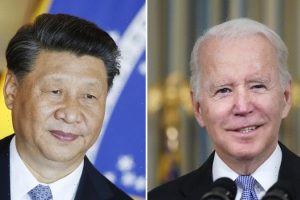Biden seeks to enlist China in fight with OPEC to lower petrol prices

Singapore: Governments from some of the world’s biggest economies said on Thursday they were looking into releasing oil from their strategic reserves.
It follows a rare request from the United States for a coordinated move to cool global energy prices and ahead of a meeting of major oil producing countries.
US President Joe Biden and China’s President Xi Jinping.Credit:AP
The Biden administration has asked big oil buyers such as India and Japan – as well as China for the first time – to consider releasing stocks of crude, several people familiar with the requests told Reuters on Wednesday. Oil prices fell on the news.
As the world economy rebounds from the pandemic, Washington is frustrated that producers in OPEC+, the Organisation of the Petroleum Exporting Countries and allies such as Russia, have rebuffed US requests to speed up oil supplies.
With gasoline prices and other costs rising, US President Joe Biden also faces political pressure ahead of midterm elections next year. A Reuters poll in October showed 67 per cent of U.S. adults agreed that inflation is a very big concern.
OPEC+ plans to meet on December 2. The group has taken a slower approach to boosting output, viewing the economic recovery as too fragile to justify more supply.
China’s state reserve bureau told Reuters it was working on a release of crude oil reserves, but declined to comment on the US request.
The United States has the largest strategic reserve at more than 600 million barrels. The US SPR was set up in the 1970s after the Arab Oil Embargo to ensure the nation had adequate supply to weather an emergency. In the last several years, the shale boom has pushed US output to rival that of Saudi Arabia and Russia.
By involving China for the first time, this proposal is an unprecedented challenge to OPEC, the cartel that has influenced oil prices for over five decades. China is the world’s No. 2 oil consumer and largest importer.
Docked oil drilling platforms in Port Aransas, Texas. Credit:AP
There was no immediate official reaction from OPEC+ members. The group has been raising output by 400,000 barrels per day per month, gradually unwinding record production cuts made in 2020 when the pandemic sank fuel demand.
This week, Secretary General Mohammad Barkindo said OPEC expects an oil supply surplus to begin building next month. In September, exports from Saudi Arabia rose to 6.52 million barrels per day, highest since January.
One OPEC source who asked not to be named said it would be surprising to see consuming countries release stocks to lower prices rather than to meet a supply shortage.
However, several large world energy consumers have been pressing OPEC to boost supply. China elected to release reserves in September to try to stabilise prices. India has expressed frustration for months, and sharply cut purchases from Saudi Arabia in the spring due to rising costs.
“This is not a case of supplies not being available,” Hardeep Singh Puri, India’s oil minister, told a conference in Dubai on Wednesday. “There are 5 million barrels a day of supplies available which have not been released for whatever reason.”
The United States and its allies have coordinated strategic petroleum reserve releases before, such as in 2011 when supplies were hit by a war in OPEC member Libya. Coordination has been handled through the Paris-based energy watchdog the International Energy Agency, whose membership includes the United States, Japan and numerous European nations.
The United States, however, did not ask the European Union for its participation, according to a source familiar with discussions, saying Europe’s primary problem has been related to higher natural gas prices.
The IEA, on its web site, said such releases are not meant for price intervention. Both Japan and South Korea were contacted by the United States, and both said they do not release reserves simply to deal with rising prices.
If China is doing its release in coordination with other nations, it would be the first such time, said Sengyick Tee, analyst at Beijing-based consultancy SIA Energy.
Reuters
Get a note directly from our foreign correspondents on what’s making headlines around the world. Sign up for the weekly What in the World newsletter here.
Most Viewed in World
From our partners
Source: Read Full Article


